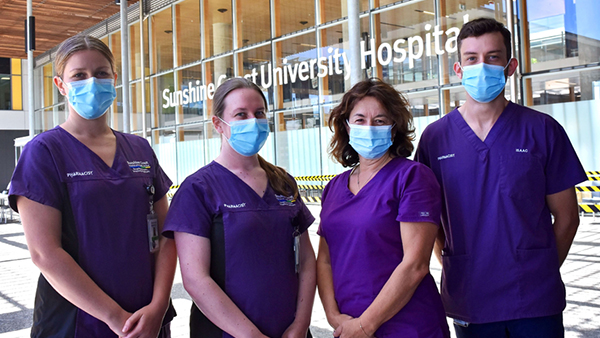
Today marks the one-year anniversary of Sunshine Coast Hospital and Health Service’s (SCHHS) COVID-19 vaccination program, which has administered more than 269,000 doses of the vaccine to locals and visitors to the region during the past 12 months.
SCHHS COVID-19 Vaccination Service Team Pharmacist Lead Elicia McDougal said the delivery of the program – the first of its kind for the health service – had been a challenging but very successful collaborative effort, with benefits for the entire community.
"It’s been so encouraging to see the response from the community throughout the pandemic, with our vaccination rates largely higher than the state average.
“More than 93 per cent of adults in the Noosa local government area (LGA) and more than 92 per cent of adults in the Sunshine Coast LGA have now received two doses of the vaccine, compared with a state of average of 90.9 per cent. More than 87 per cent of people in the Gympie LGA have also had two doses.
“In doing so, the community has made an incredible difference; not only protecting their own health but also the health of their loved ones, neighbours, colleagues and friends.
“Our health service has now administered 269,238 doses of the vaccine and the success of the program has definitely been a consolidated effort, with a multidisciplinary team coming together to deliver the program.
“It’s an undertaking that’s never happened here before. We’ve had rapid collaboration of clinical staff with IT, administration, communications, facilities, hire companies, leases, traffic management, and so the list goes on.
“The changeability of the program has been the biggest challenge. It’s been a whirlwind of activity and we’ve pivoted and turned many times over. We’ve had to be innovative and creative and adapt to the changing environment around us.
“We’ve opened clinics, closed clinics, changed clinic locations, gone from one to two, to three vaccines, had to manage staff and supply availability as well as meet changes to vaccination expiration dates and storage and transportation requirements, all while working under very tight timelines and high levels of scrutiny.
“Standing up our first mass vaccination clinic at Caloundra in just 48 hours was one of our biggest challengers, and probably one of our proudest moments as a team.
“It was really easy to be passionate about the vaccine rollout because it was so important to help slow the spread of the virus and save lives. It’s been very rewarding to see the changes in the community because of it.
“How the program evolves in the future will depend on what happens with COVID-19 variants and how our immunity responds. It’s a pandemic and we don’t know what will happen next, the chances are it will keep going, but in what capacity we will need to wait and see,” Elicia said.